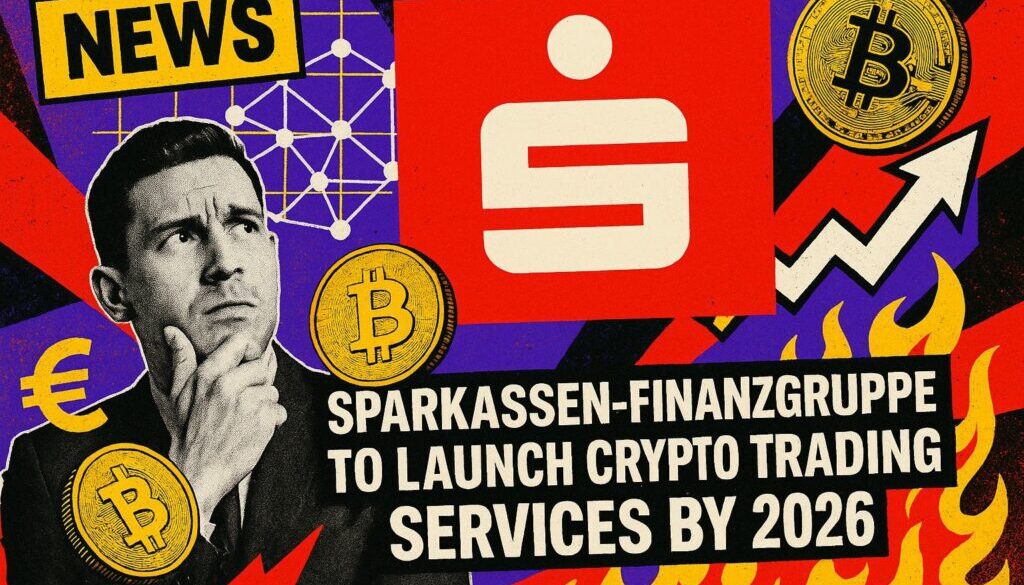Sparkassen-Finanzgruppe to Launch Crypto Trading Services by 2026

Sparkassen-Finanzgruppe to Launch Crypto Trading Services by 2026
Germany’s financial landscape is on the cusp of a significant transformation as Sparkassen-Finanzgruppe, the nation’s largest banking group, prepares to launch crypto trading services. This monumental move, expected by summer 2026, signals a profound shift for an institution that previously harbored strong reservations about digital assets, even prohibiting crypto purchases as recently as 2015.
With a customer base of 50 million, Sparkassen’s entry into the crypto market is poised to dramatically accelerate mainstream adoption of digital assets within a regulated framework. This strategic pivot reflects an adaptation to evolving market demands and a response to the clear regulatory environment established by the European Union’s Markets in Crypto-Assets (MiCA) regulations.
Sparkassen’s Bold Leap into Crypto Trading
By summer 2026, Sparkassen plans to integrate crypto trading capabilities directly into its widely used Sparkasse app. This will allow its extensive retail customer base to seamlessly trade Bitcoin and other digital assets, transforming how millions of Germans interact with cryptocurrencies.
The operational backbone for this new service will be provided by Dekabank, Sparkassen’s securities subsidiary. Dekabank, already active in the crypto sector, will manage the custody and execution of these digital asset trades. This partnership aims to ensure a secure and reliable experience for customers, leveraging Dekabank’s existing expertise and Sparkassen’s trusted digital channels.
This initiative represents more than just a new service offering; it’s a major strategic shift for the entire Sparkassen network. It underscores the banking group’s commitment to adapting to the rapidly evolving financial landscape and meeting the growing demand for digital asset access among its clientele.
Why the Change of Heart? Unpacking Sparkassen’s Crypto Evolution
Sparkassen-Finanzgruppe’s decision to embrace crypto trading marks a remarkable turnaround from its previous cautious stance. Several key factors have driven this strategic shift:
- Regulatory Clarity (MiCA): The primary catalyst is the EU’s Markets in Crypto-Assets (MiCA) regulation, which took full effect in December. MiCA provides a comprehensive legal framework for crypto assets, offering the regulatory clarity and certainty that traditional financial institutions like Sparkassen require to confidently enter the market.
- Evolving Market Demand: There’s an undeniable and growing demand for digital assets, particularly Bitcoin, among retail investors. Sparkassen’s move is a direct response to its customers’ increasing interest in accessing these new investment opportunities.
- Competitive Pressure: The traditional banking sector is facing increasing competition from innovative fintech companies and even other established banks that are already exploring or offering crypto services. To remain relevant and competitive, Sparkassen must adapt its offerings.
- Providing Regulated Access: The German Savings Banks Association (DSGV) emphasized that this move aims to provide reliable access to a regulated crypto offering. By bringing crypto services under its umbrella, Sparkassen can offer a trusted, secure, and compliant pathway for its customers, mitigating risks associated with unregulated platforms.
Despite this significant shift, the DSGV has reiterated that cryptocurrencies remain speculative investments. Consequently, there will be no promotional activities for the new service, highlighting a cautious yet progressive approach.
Germany’s Banks Embrace Digital Assets: A Shifting Landscape
Sparkassen’s entry into the crypto sphere is not an isolated event but rather part of a broader trend among German financial institutions. Several other prominent banks are also actively exploring or launching their own digital asset initiatives, signaling a widespread acceptance of crypto within traditional finance:
- DZ Bank: This cooperative bank is collaborating with Boerse Stuttgart Digital to offer crypto trading and custody services to its network of 700 cooperative banks. They are also developing a blockchain-based digital asset custody platform.
- Landesbank Baden-Württemberg (LBBW): Germany’s largest federal bank, LBBW, is set to offer crypto custody services to institutional clients, starting in the second half of 2024, through a partnership with Bitpanda.
- Commerzbank: Another major German bank, Commerzbank, has partnered with Crypto Finance to provide Bitcoin and other cryptocurrency trading services.
These parallel initiatives underscore a collective recognition among German banks that digital assets are becoming an integral part of the financial ecosystem. Sparkassen’s move, given its sheer size and reach, solidifies this trend, pushing the entire industry further towards mainstream crypto integration.
Looking Ahead: A New Era for German Finance
Sparkassen-Finanzgruppe’s decision to launch crypto trading services by 2026 marks a pivotal moment for both the German financial sector and the broader cryptocurrency industry. It signifies a profound evolution in how traditional banking institutions perceive and interact with digital assets. By providing regulated, accessible crypto services to its vast customer base, Sparkassen is not just adapting to change; it is actively shaping the future of finance.
This move, coupled with similar initiatives from other leading German banks, indicates a clear trajectory towards increased institutional involvement and mainstream adoption of cryptocurrencies. While the DSGV remains cautious about the speculative nature of crypto, the provision of a regulated offering through trusted banking channels is a crucial step towards building confidence and accessibility in the digital asset space.


